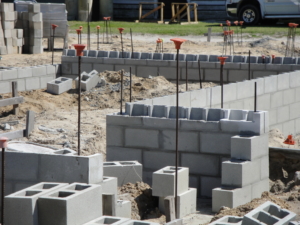Ocala custom home builder explains why it’s important to have a sub-surface soil evaluation done before you build.
 OCALA, FLORIDA—You can’t drive down the road these days without seeing a billboard advertising a law firm offering their services in the event your home has suffered structural settling due to a sink hole. Truth be told, many cases aren’t always sinkhole-related, but instead are caused by other subsurface, soil-related issues.
OCALA, FLORIDA—You can’t drive down the road these days without seeing a billboard advertising a law firm offering their services in the event your home has suffered structural settling due to a sink hole. Truth be told, many cases aren’t always sinkhole-related, but instead are caused by other subsurface, soil-related issues.
Here at Nadeau-Stout Custom Homes, a custom home builder in Ocala, we take extra steps to ensure you can sleep peacefully at night knowing your home was designed specifically to rest on the ground it was placed by using state-of-the-art subsurface soil evaluation techniques and foundation design processes.
Many Florida builders fail to educate their clients about the risks associated with building on varying types of subsurface soils and the many types of soil conditions we deal with here in North Central Florida. Consumers often are reluctant to spend money for proper pre-construction testing unless the importance of it is emphasized.
That’s a big mistake.
Soil is the base of your job site
“Soils are the most important construction material you’ll have on any job site,” says Hal Barrineau, a structural engineer with HW Barrineau & Associates, Inc. in Ocala. The weight of all materials of construction incorporated into a building, i.e. walls, floors, roofs, ceilings and stairways are loads known as “dead loads”. For structures below ground, the soil and hydrostatic pressure from ground water are also considered dead loads. Likewise, the loads generated by wind, rain, snow, earthquake and flood are considered “live loads”. Both dead and live loads are forces that must be accounted for in the structure design. These forces are transferred to the underlying soils which must be sufficiently adequate to support the structure. If the underlying soils are not adequate then structural distress is imminent and can even occur prior to completion of construction.
Taking a proactive approach and evaluating the sub-surface soil conditions determines whether the soil is capable of sufficiently supporting the loads imposed by the structure.
“Often the importance of soil as a construction material is overlooked. If the integrity of the soil is problematic, then that’s going to manifest itself after the loads are applied in the way of problems with the structure,” says Barrineau, an engineer in Florida since 1993.”
When Houses Settle
If you see signs of stress in your structure, such as cracks in the foundation and walls, or uneven floors, the usual protocol is to call your insurance company. In accordance with Florida Statutes, the insurance company must determine whether or not the damage is the result of sinkhole activity. The insurance company sends out a claims adjuster and the adjuster makes a determination on whether the company should retain the services of a geotechnical engineer to do an investigation. The insurance company usually bears the cost of paying for the investigation, which can be substantial. The investigating engineer will prepare a report of his findings and render an opinion as to whether or not the damage is sinkhole related. If he believes it is then the report will include recommendations for remediation of the sub-surface soils. If not, this is usually where the insurance company’s participation ends.
If soil remediation within 10 to 15 feet below the surface is called for, one potential solution is chemical grouting, also known as permeation grouting, which is used to increase the integrity/bearing capacity of the underlying soils immediately beneath the structure’s foundation. This method is usually done as part of a comprehensive remediation plan which also may include deep cement grouting and underpinning.
For remediation deeper than 15 feet, cement grouting- also known as pressure grouting- is used. This method of injecting cement grout into the voids and fractures of the underlying limestone formation and/or weak soil strata is the most common solution.
After remediation of the underlying soils the structure also must be supported, Barrineau says. A structural engineer can design a solution to remediate the foundation which may requires the underpinning of the structure. This is done by installing piers or piles under the existing foundation to stabilize the structure.
“Identifying the right solution for the right soils before construction can save owners a lot of stress and discomfort of post-construction remediation, not to mention the added cost of cosmetic repairs after the foundation has been stabilized,” says Rusty Stout, managing member of Nadeau-Stout Custom Homes.
Sub-Surface Soil Evaluation Methods
Soil testing methods fall into two categories: lab tests and field tests.
Lab tests are performed on concrete and soils to determine compressive strength. Barrineau compares the proper mixture of cement to making a cake according to its recipe. Concrete requires the right amount of sand, rock, cement and water.
“If you mess up any of the ingredients, the concrete isn’t going to perform as it should,” he says.
Soil samples pulled from deep borings are tested to identify their properties, such as gradation and natural moisture content. If clay is present, the plasticity and the liquid limit of it must be determined. All of these factors contribute to the projected performance of the soils.
Many insurance companies today refuse to issue homeowner policies in certain zip codes due to increased sinkhole claims in those regions.
The Florida Office of Insurance Regulation has reported steady increases of sinkhole and settling claims over the last few years. A 2010 report, “Report on Review of the 2010 Sinkhole Data Call, November 8, 2010, Florida Office of Insurance Regulation,” stated that total sinkhole costs increased from $209 million in 2006 to $406 million in 2009.
The total of reported claims rose from 2,360 in 2006 to 6,694 through the first nine months of 2010. Of the total number of sinkhole claims in Florida, Marion County is fifth in the state behind Hernando, Pasco, Hillsborough and Pinellas counties.
Don’t be a Statistic
Here at Nadeau-Stout Custom Homes, we understand these risks and take pre-construction geotechnical testing seriously. Bad soil conditions can have a huge effect on the overall construction budget, so we recommend doing geotechnical testing before you build and perhaps even before you buy the property.
Doing your homework up front by performing proper testing is the best insurance you can buy.






